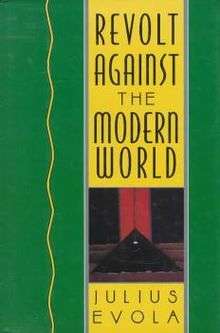Revolt Against the Modern World
Revolt Against the Modern World: Politics, Religion, and Social Order in the Kali Yuga (Italian: Rivolta contro il mondo moderno) is a book by Julius Evola, first published in Italy, in 1934. Described as Evola's most influential work,[1] it is an elucidation of his Traditionalist world view.
 First edition English hardcover, published by Inner Traditions in 1995 | |
| Author | Julius Evola |
|---|---|
| Language | Italian |
| Subject | Traditionalism |
Publication date | 1934 |
| Media type | |
The first part of the book deals with the concepts of the Traditional world; its knowledge of the bridge between the earthly and the transcendent worlds. The second part deals with the modern world, contrasting its characteristics with those of traditional societies: from politics and institutions to views on life and death. Evola denounces the regressive aspects of modern civilisation (using Tradition as a normative principle).
Rivolta contro il mondo moderno was published in Milan by Hoepli in 1934. In 1969 a revised and augmented edition was published. Translated into English by Guido Stucco (from the 1969 edition), it was published by Inner Traditions in 1995 and as a 375-page hardcover (ISBN 089281506X). It has also been translated into German, Spanish, French, Serbian and Hungarian.[2]
The book influenced Mircea Eliade and other thinkers in the Traditionalist school, as well as the European Nouvelle Droite.[3]
References
- Horowitz, Jason (10 February 2017). "Steve Bannon Cited Italian Thinker Who Inspired Fascists." The New York Times (NYTimes.com). Retrieved 8 July 2019.
- "Julius Evola Bibliography: RIVOLTA CONTRO IL MONDO MODERNO". Archived from the original on 15 May 2011. Retrieved 9 September 2015.
- Elisabetta Cassini Wolff, "Evola's interpretation of fascism and moral responsibility", Patterns of Prejudice, Vol. 50, Issue 4-5, 2016. pp. 478-494.
Further reading
- Paul Furlong, The Social and Political Thought of Julius Evola, London: Routledge, 2011. ISBN 9780203816912